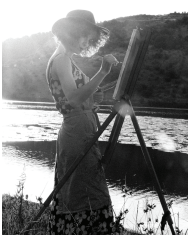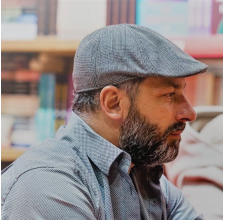Elsa Paja is a visual
artist living in
Tirana. Although she
completed her studies
in Mathematical
Informatics Engineering
at the Faculty of Natural
Sciences, her love and
passion for visual arts
has been stronger. She
devoted to art a lot of
time, love and energy to
it. For years, in addition
to visual arts such as
painting, illustrations
or photography, she
has been working as a
Graphic Designer
- Art is a form of communication through which you express and convey feelings, thoughts, and movement. For a communication to happen, there will have to be more than one person. As people, we are a product of each other in society, it would be impossible for me not to be influenced by society, culture or history in what I do, in what I am. My creative activity is part of being me as a person, it cannot be separated, just as I cannot be separated from the society in which we live. This does not mean that we should fall into the comforts of society, quite the opposite, we become part of society where we want to fight the oppression that happens in society. The artist chooses his object as much as he is chosen by it. Art is a revolt against everything that is bad and unfair in the world. And should give it time and lot of energy. As Virginia Woolf once said: “The most regretful people on earth are those who felt the call to creative work, who felt their own creative power restive and uprising, and gave to it neither power nor time”. Not only culture and society give shape to our creative activity, but it is also its subject, even although often unconsciously. It is impossible for our art to be different from our life, the artist himself cannot be separated from his work, from his life itself.
- There are different spaces that complement each other. Having the necessary space to create, to work, or as Virginia Woolf would say “to have a room of your own” is necessary, because there you reflect, you clear your mind, to go out into the city, into the common environment of people, where people keep sharing things with each other and communicating.
- I chose Prishtina because I chose Kosovo. In fact, I don’t feel like a stranger here in Prishtina, I even feel much more comfortable than in Tirana where I live. What fulfills me the most is when I go beyond the center. In the center everything happens, but at the same time nothing happens, things are fast, and you can’t understand their movements, often because they are empty, you can’t catch some fragments of everyday life that you can elsewhere, that are things that give so much meaning to life. The way different people live, how they create rituals in coherence with each other, has always fascinated me. Albanians have had and still have the spirit of communities, which is so important for the preservation of tradition, but also of humanity. The Albanian people, despite the difficulties of life and numerous struggles, have managed to survive and develop their ethnoculture, with the energy and wealth that characterizes it. Keeping customs, rituals is a kind of communication between generations and centuries. Culture is not static and finite, it can be developed and enriched. To enrich it, it will take a lot of work and new methods in order to be preserved. This is one of the reasons why I became part of this residence. Since many parts of the traditions are on the verge of extinction, I can capture and show them more through illustrations. It is challenging for you the fact that you will have to give an image to what was once only spiritual. And that’s why i love doing it, because it challenges me. In recent decades, Kosovo has faced a strong aggression from Serbia, thousands of houses have been burned or destroyed, including many important cultural monuments. Serbia still keeps Kosovo over 1247 archaeological and ethnographic artifacts that were taken from the last war and have not returned. Regardless of the aggression it has faced, Kosovo has managed to work well in preserving culture and tradition, this also because of the love people have for it.
- Illustration is another type of writing where words are images. I illustrate to give people the “words” to know their own experience and history.




